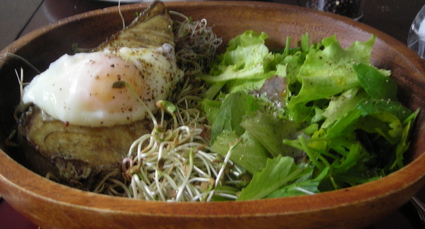Free-range lobster: Food buzzwords rendered meaningless
/Certain buzzwords in the food world are almost a requirement in certain circles: organic, local, cage-free, grass-fed, and free-range jump into my mind.
There is also a general consensus these terms are being diluted past the original intention as more people latch onto them as passwords connoting meaning to the consumer concerned about eating responsibility when, in fact, the word denotes nothing.
Let us take them in order: organic. I was not there at the beginning of the organic labeling discussions but I feel many people hear organic food and they feel the vegetables have received “healthier†pesticides or none at all. That is not true.
I learned in my Master Gardener Class that certain botanical pesticides have as much or more toxicity than their synthetic equivalent. Organically labeled vegetables can still be coated with pesticides and grown in monoculture plots. However, organic does mean the plant is neither irradiated nor genetically modified. Whether “organic†is better for you enzymatically or nutritionally is an issue of current debate.
Local
I spoke to Martin Ruhlig, of Ruhlig’s Produce, this year at the HomeGrown Summit. He shared a story about his relative who was part of a major grocery chain’s “buy local†campaign. The trucks picked up the produce in Michigan and drove it to the distribution hub in Ohio - where it was mixed with all of the other “local†produce and reassigned to their stores within range. What does ocal really mean?
Cage-free
Cage-free poultry does not mean the birds are roaming across the prairie digging bugs and running around. Cage-free just means they are not kept in a cage. It does not say how much room the girls have. It does not address that chickens crammed together have their beaks burned off so they are unable to harm each other in the cramped conditions. The process is called debeaking or beak trimming. I found a truly disturbing slideshow of conditions in a “cage-free†facility, click here for it.
Hearing that term does not mean the animal has been munching on pastures for its entire life either. In fact, it could mean that the animal ate grass for a week or a couple of months before putting the animal on feed to fatten it up quickly and save money.
Free-range
Again, it does not necessarily mean animals roaming on pastures. The USDA regulation states the animals must be “allowed access to the outside.†A door opened for 30 minutes a day, perhaps. A door opened does not mean animals are walking through it to see the sun.
All of this brings me to my free-range lobster story.
A few years ago, I was at a restaurant in New England, looking at the menu with the server standing over the table.
I look up and address her, “Tell me where your meat comes from.â€
“It is from a local farm, organic, free-range. They found a really old breed and it is a small herd.â€
“OK, good to know.â€
I pause, and still scanning the menu, say to my tablemates - “The lobster looks good.â€
The server jumps in. “Oh yes, the lobster is free-range.â€
I turn to her, trying not to laugh. “Really, free-range lobster, that is great.â€
As people eat more consciously they rely on words to tell them information about the food. Unfortunately, many of those words do not mean what we think they do. We are being co-opted by words that sound healthy, free and humane. The vocabulary has been co-opted as legalese for a distasteful reality.
Here is the link to the article on annarbor.com




